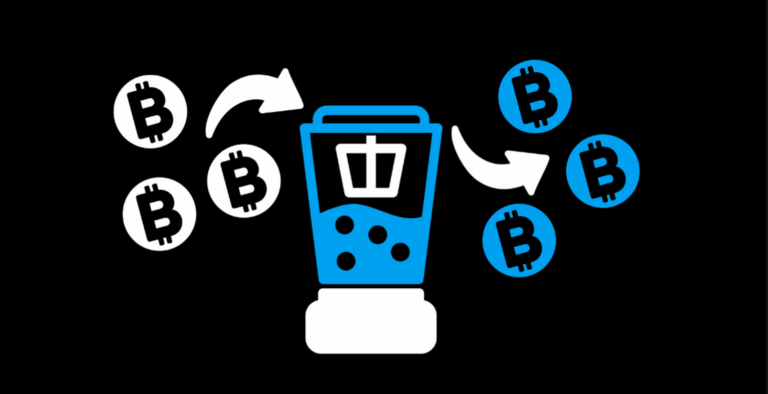Welcome to the wild world of cryptocurrencies, where the rules are made up and the regulations don’t matter! In this article, we’re going to delve into the mysterious realm of Bitcoin mixers, a tool that is often used by those who want to keep their transactions private. We’ll explore what they are, how they work, the different types of mixers, their pros and cons, and whether or not they’re legal.
What is Bitcoin mixing?
Bitcoin mixing, also known as Bitcoin tumbling, is the process of obscuring the connection between a Bitcoin address and the user behind it. When you use Bitcoin, all of your transactions are recorded on the blockchain, a public ledger that anyone can access. This means that if someone knows your Bitcoin address, they can see all of the transactions associated with it.
So let’s say you’re about to organize a cooking party with your friends and you need a new stash of oregano, but your bank just lost all your money, so all you have left now is your bitcoin that you safely stored in your hardware wallet. You could just use this bitcoin to pay at your local store that hopefully accepts bitcoin payments. But what if you actually care about your privacy and don’t want everyone to know about your passion for cooking?
This is where Bitcoin mixers come in. Essentially, a Bitcoin mixer takes your Bitcoin and mixes it with the Bitcoin of other users, making it much more difficult to trace your transactions back to you.
Although the usage of bitcoin mixing is often associated with criminal activities, it doesn’t always have to be about that. What if some hypothetical person just doesn’t want their pornhub subscription popping up in their bank statement? What are some popular types of bitcoin mixing?
There are three basic types of mixing:
CoinJoin: a protocol that combines multiple transactions from different users into a single transaction, making it more difficult to track individual transactions.

Image source: BitcoinMagazine
Chaumian CoinJoin: a variation of CoinJoin that uses a blind signature scheme to further obscure the connection between addresses and transactions.
Stealth addresses: a technique that allows for the creation of multiple addresses that all lead to the same wallet, making it difficult to trace transactions back to a single address.
Centralized vs. decentralized mixers
There are two types of Bitcoin mixers: centralized and decentralized. Centralized mixers are operated by a single entity or organization, and users send their Bitcoin to the mixer, which then mixes it with the Bitcoin of other users before sending it back to the original user. Decentralized mixers, on the other hand, are peer-to-peer networks where users can mix their Bitcoin with other users’ Bitcoin directly.
But we don’t trust anyone and value our privacy right? So trusting a centralized entity with our transactions doesn’t seem very appealing.
Problems with using mixers
While Bitcoin mixers can provide a certain level of privacy, they are not without their drawbacks. For one thing, using a mixer can be expensive, with fees ranging from a few percent to as much as 5%. Additionally, there is no guarantee that the mixer you’re using is trustworthy or won’t steal your Bitcoin, so always try these things out with small amounts first and thread carefully. Finally, using a mixer can be a red flag to nosy law enforcement agencies, who may investigate the bitcoin wallet for money laundering or other illegal activities and may be able to still trace it back to you.
Are bitcoin mixers illegal?
The legality of Bitcoin mixers is a bit of a gray area. While there is no specific law that prohibits the use of Bitcoin mixers, they can be used for illegal activities such as money laundering, which can land you in hot water with the authorities. It’s important to note that while Bitcoin itself is not illegal, illegal activities themselves are. So if you’re thinking about using a Bitcoin mixer, make sure you’re doing it for legitimate reasons.
Alternatives to bitcoin mixers
If you’re concerned about your privacy when using Bitcoin, there are alternatives to using mixers. For example, you can use a Bitcoin wallet that supports the Tor network, which can help obscure your IP address and make it more difficult to track your transactions. Additionally, you can use a privacy coin like Monero, which is designed to be much more difficult to trace than Bitcoin.
There also are newer technologies emerging, sending tokens from one address to another privately is one thing, but interacting with smart contracts and participating in decentralized finance (DEFI) is another. This is why Aleph Zero ($AZERO) and Secret Network ($SCRT) are being developed. But that would be a topic for another day.
Conclusion
Bitcoin mixers can be a useful tool for those who want to keep their transactions private, but they come with their own set of risks and drawbacks. It’s important to note that there is no foolproof way to completely hide your transactions from prying eyes, so always use caution and be aware of the risks involved.
When it comes to choosing the best Bitcoin mixer, there are several factors to consider. First and foremost, you’ll want to make sure that the mixer you’re using is trustworthy and has a good reputation in the community, like the Wasabi wallet. You’ll also want to consider the fees associated with using the mixer, as some mixers can be quite expensive. Finally, consider the type of mixer that you want to use, as different types of mixers offer different levels of privacy and convenience.
So next time you want to pay your Starbucks in Bitcoin, and don’t want the barista to see your entire account balance and history, you may consider a mixer! And it is up to you if you want to go through all the pros, cons, security risks and other implications in the name of privacy.
